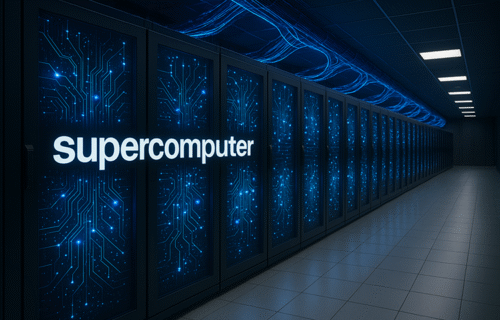Germany has officially launched Jupiter, Europe’s fastest supercomputer, at the Jülich Research Centre in North Rhine-Westphalia. The system is also ranked fourth worldwide on the Top500 list of the most powerful computers, underscoring Europe’s ambition to close the gap with the United States and China in high-performance computing and artificial intelligence.
Chancellor Friedrich Merz described the inauguration as a milestone for Germany’s role in digital technology. “We want Germany to become an artificial intelligence nation,” he said, adding that the 2020s could be remembered as the “decade of artificial intelligence.”
Jupiter – short for Joint Undertaking Pioneer for Innovative and Transformative Exascale Research – is the first European system designed to exceed one exaflop of performance, meaning it can carry out over one quintillion (10^18) calculations per second. This capability makes it vital for training advanced AI models, running complex climate and weather simulations, and enabling new breakthroughs in areas such as medical research and energy systems.
According to Astrid Lambrecht, chair of the Forschungszentrum Jülich board of directors, Jupiter is also the world’s most energy-efficient exascale-class system. “At a time when digitization and AI demand more and more energy, Jupiter shows how sustainable computing can be achieved,” she said. The machine uses advanced water-cooling and modular architecture designed by France’s Atos (Eviden) and U.S.-based NVIDIA, which supplied its cutting-edge Grace Hopper superchips.
The project cost around €500 million, with half the funding provided by the European Union and the remainder split between the German federal government and the state of North Rhine-Westphalia. The investment is part of the EuroHPC initiative, which aims to give Europe sovereign capacity in high-performance computing.
Beyond AI development, the system will be used to improve extreme weather forecasting, such as predicting floods and heatwaves, and to advance neuroscience research by modeling brain function for new therapies.
Jupiter’s launch also highlights Europe’s growing presence in the global supercomputing race. According to the latest Top500 ranking (June 2025), two of the world’s top 10 machines are in Europe: Jupiter in Germany at number four and Leonardo in Italy at number 10. By comparison, the world’s fastest system remains Frontier in the U.S., capable of over 1.1 exaflops.
While acknowledging concerns over AI, Lambrecht stressed that fears of machines gaining human-like consciousness are misplaced. “Large AI models still fail in logical reasoning,” she told DPA. “In the medium term, it is not realistic to expect them to develop their own awareness.”
With Jupiter now online, Europe has taken a major step toward technological sovereignty, giving its scientists and industries access to a tool designed to compete at the very top level of global computing power.
